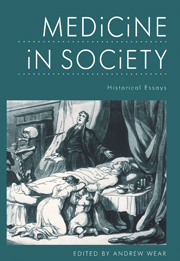Book contents
- Frontmatter
- Contents
- List of contributors
- Introduction
- Healers in the medical market place towards a social history of Graeco-Roman medicine
- Medicine and society in medieval Europe, 500-1500
- The patient in England, c. 1660–c. 1800
- Making sense of health and the environment in early modern England
- Medicine in the age of Enlightenment
- The rise of the modern hospital in Britain
- Medical practitioners 1750–1850 and the period of medical reform in Britain
- Public health, preventive medicine and professionalization: England and America in the nineteenth century
- Madness and its institutions
- From infectious to chronic diseases: changing patterns of sickness in the nineteenth and twentieth centuries
- Providers, ‘consumers’, the state and the delivery of health-care services in twentieth-century Britain
- The implications of increased life expectancy for family and social life
- Index
Medical practitioners 1750–1850 and the period of medical reform in Britain
Published online by Cambridge University Press: 13 January 2010
- Frontmatter
- Contents
- List of contributors
- Introduction
- Healers in the medical market place towards a social history of Graeco-Roman medicine
- Medicine and society in medieval Europe, 500-1500
- The patient in England, c. 1660–c. 1800
- Making sense of health and the environment in early modern England
- Medicine in the age of Enlightenment
- The rise of the modern hospital in Britain
- Medical practitioners 1750–1850 and the period of medical reform in Britain
- Public health, preventive medicine and professionalization: England and America in the nineteenth century
- Madness and its institutions
- From infectious to chronic diseases: changing patterns of sickness in the nineteenth and twentieth centuries
- Providers, ‘consumers’, the state and the delivery of health-care services in twentieth-century Britain
- The implications of increased life expectancy for family and social life
- Index
Summary
Important changes occurred in the medical profession in Britain between the late eighteenth and the middle of the nineteenth century which have earned it the title ‘ The period of medical reform ’. Traditionally this period has been described as one of uninterrupted progress, confirmed by medical legislation in the Apothecaries Act of 1815 and the Medical Act of 1858. Those who have adopted the progressive view base it on advances in medical education and professional unity in this period. Educational advances were made possible by the growth of academic medicine and the development of the voluntary hospitals as centres of teaching, research and care. While the study of medicine in Oxford and Cambridge had scarcely emerged from the doldrums of the eighteenth century, the development of medical education at London University and the establishment of provincial medical schools were products of the movement for reform. The foundation of medical associations – especially ciations – especially the Provincial Medical and Surgical Association, the predecessor of the British Medical Association – are cited as evidence of the birth of a new spirit of professional unity. The introduction of the LSA (Licence of the Society of Apothecaries) in 1815 and the MRCS (the diploma of Membership of the Royal College of Surgeons) – the dual qualification known colloquially as ‘ College and Hall ’ – provided the general practitioner with a broad education and formal certification. It is quoted not only as evidence of the rise of the lower ranks of the profession, but also of the protection of the public from unqualified medical practitioners.
- Type
- Chapter
- Information
- Medicine in SocietyHistorical Essays, pp. 219 - 248Publisher: Cambridge University PressPrint publication year: 1992
- 7
- Cited by



